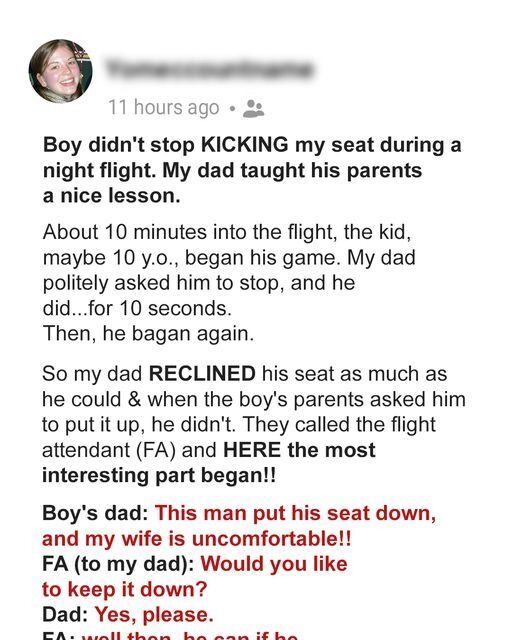I had been looking forward to a peaceful flight, a chance to read and maybe doze off for a while. That hope evaporated with the first few tentative kicks against my seatback. At first, it was a minor annoyance, but it soon escalated into a relentless, jarring rhythm that made concentration impossible. The source was a boy of about seven, completely absorbed in a video game, his feet working tirelessly against my seat. His parents were seated beside him, offering no correction or even a glance in his direction. My own frustration was mounting, and I could see my dad, who was sitting next to me, taking notice of the growing disturbance.
My father, ever the gentleman, decided to address the issue directly with the parents. He leaned back and in a friendly, non-confrontational voice, asked if they could kindly encourage their son to keep his feet still. They offered a curt apology and a half-hearted word to the boy, who paused for a moment before resuming his activity with renewed vigor. The kicking returned, now more insistent than before. It was clear that a polite verbal request was not going to be enough to solve the problem. I braced for a potential conflict, but my dad simply sat in silence for a moment, a contemplative look on his face.
His solution was both brilliant and beautifully simple. He didn’t say a word to the family behind us. Instead, he reached for the button on his armrest and smoothly reclined his seat to its full extent. The movement was slow and deliberate. The immediate result was a startled yelp from the boy’s mother, who now found her own space significantly compressed. She began to complain loudly, calling for a flight attendant to intervene. When the attendant arrived, she listened to the complaint and then politely explained that passengers are permitted to recline their seats during the flight. The mother was left with no recourse. From that moment on, the kicking ceased entirely, and the rest of our journey was wonderfully quiet.
After we landed, my dad shared the reasoning behind his action. He said that people often fail to grasp the impact of their behavior until they are on the receiving end of a similar inconvenience. By reclining his seat, he hadn’t been seeking revenge; he had been providing a tangible, physical example of what it feels like to have your personal space and comfort compromised. It was a silent, powerful lesson in empathy that required no lecture or argument. The problem resolved itself the moment the parents were made to feel a fraction of the discomfort they had been allowing their son to inflict.
That experience was a profound lesson in practical problem-solving. My dad taught me that you don’t need to engage in a shouting match to be heard. Sometimes, a calm and clever action can communicate more effectively than a thousand words. It was a demonstration of how to stand your ground with intelligence and poise, turning a frustrating situation into a quiet victory for common courtesy. The memory of that flight continues to remind me that the most elegant solutions are often born from a calm mind and a little creative thinking.


